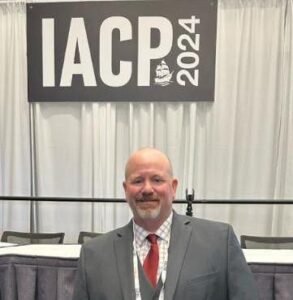Change “Not My”? To “Not My”! By: Brad Thorn
It’s long past time to change our mindset about cyber-enabled fraud—also known as scams—including within law enforcement. The prevailing attitude among many citizens can be summed up in five naive and dangerous words;It won’t happen to me. This mindset,
combined with the lack of protections from social media platforms, telecommunications companies, and financial institutions, has resulted in a reality where American citizens are more likely to become victims of cyber-enabled fraud than not. This widespread complacency has allowed scamming to grow into a thriving trillion-dollar industry, complete with infrastructure and an ecosystem to support it. Just look at the expansion of scam compounds in Myanmar from 2020 to 2024.
Cyber fraud is so lucrative that traditional criminal enterprises are shifting away from riskier crimes that carry heavier penalties. It’s a simple risk-reward calculation: criminals can make more money while facing lighter sentences if caught. Plus, they don’t even have to leave their homes to commit these crimes. As technology connects us more than ever before, criminals follow the money—and today, the money is online where the people are.
Unfortunately, there is little evidence that U.S. lawmakers are seriously addressing this growing threat. Other countries have recognized the urgency by appointing Scam Czars to shape policy
and allocate resources to combat scams. The United States, however, has not designated a cent to fight this issue. There is no centralized information or reporting center for victims, and in many cases, victims have nowhere to turn. Federal agencies impose high financial loss thresholds before launching investigations, while state and local agencies are often understaffed, undertrained, and view these crimes as outside their jurisdiction due to their cross-border nature. There is a lot of incredible work being done by some state and local investigators who have recognized the issue and had leadership that supports purchasing the tools needed to investigate these crimes and supporting these investigations. The tools can many times come
with an exorbitant cost that agencies cannot afford.
With the U.S. is pushing to lead in artificial intelligence and technological innovation means regulations will likely loosen, not tighten. As a law enforcement officer, I fear this means scam
victims will end up being viewed as collateral damage in the race for technological dominance.
All of this is why we must change our mindset. People are the targets, and people must be the solution. Join the “Not My” mission:
“Not my” child.
“Not my” parent.
“Not my” family.
“Not my” business.
”Not my” employees.
”Not my” residents.
And if you are in law enforcement or an elected official, “Not my” community.
The goal is to make every person in the U.S. harder to scam by encouraging families, businesses, and communities to join the NOT MY cybercrime campaign.
For example, combat imposter and family emergency scams with a family password or phrase. AI may be able to clone a voice, but it won’t know a secret code. If a scammer claims to have
arrested little Johnny and put “him” on the phone, asking for the code word can expose the fraud. With this strategy, family emergencies and AI scams become a thing of the past—”Not my” family!
Do you have a teen or young adult who is active online? Make sure they are aware of:
Sextortion
Award scams
Verification code scams
Employment scams
Peer-to-peer (P2P) scams
Marketplace scams
Financially motivated sextortion has tragically led to numerous teen suicides. It often begins on Instagram before moving to Snapchat. Social media platforms could take steps to prevent these crimes but have little incentive to do so. Don’t leave it to chance—talk with your family about these threats and what to do if targeted. Keeping an open line of communication is critical. I’ve
had the honor of speaking with families who lost children to these crimes, and each one wished they had known about these dangers in advance and had a chance to have that conversation with them.
There are countless scams and countless ways to protect against them. Learn about Pig Butchering, Romance Scams, Virus Scams, and Government Imposter Scams (Warrant Scams). While information about these crimes exists, most people don’t seek it out until after they or someone they know has already fallen victim. That must change. The time to shift our mindset is now. No longer can we believe it won’t happen, and hope for the best. Take action now, change your mindset from hoping it won’t happen to my family to taking action and making sure when it comes to anyone in your family or in your circle you can say ” family member! ❦
 About the Author
About the Author
Brad Thorne is a Financial Crimes Detective with the Boise Police Department. He started his career in law enforcement about 25 years ago with the Boise Police Department. He worked in several positions, from Patrol, Crime Scene Investigator, and Criminal Investigation. The last 15 years have been spent on financial crimes. Thorne is an instructor for new detectives as well as the financial crimes unit with the Boise PD Police Officer Standards and Training Academy.
Thorne is a Task Force Officer with the United States Secret Service Mountain West Cyber Fraud Task Force (MWCFTF) headquartered in Denver Colorado where he is tasked with investigating cyber related fraud. Thorne has achieved comprehensive experience in investigations involving Transnational Organized Crime (TOC) and other cyber related fraud. Thorne has collaborated with Federal, State and Law Enforcement partners all over the world.
Thorne holds a master’s certificate with the Idaho Police Officer Standards and Training. Through his investigations into cyber related fraud, Thorne has become part of Global Anti-Scam Alliance, The CA Crypto-Coalition, and was offered a fellowship with TRM labs. He currently holds an advanced certificate in Cryptocurrency Investigations.
Thorne continues to pursue advocacy for victims through his investigations. He received his formal education from Boise State University and received a bachelor’s degree in Multidisciplinary Studies, and a certification in Leadership Studies.
